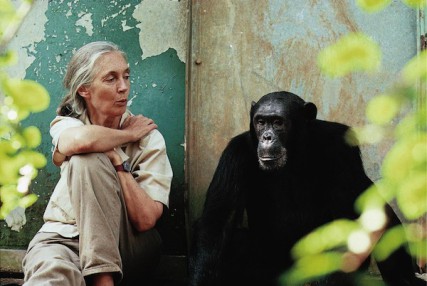
Jane Goodall can’t get away from chimpanzees. She’s peppered with questions about them. The word “primates” follows her name around like a child trails its modish older sibling.
Goodall spends most of her time writing and lecturing these days, countless miles from Gombe Stream National Park in Tanzania, but chimps are forever on her mind and she’s OK being continually associated with the animal.
Chimps, she said, taught her about compassion and love — two values underlying her continuous message of stewardship and hope for the future.
They showed her, she said, that, “we’re very clearly not the only beings with personalities, minds and feelings…Chimps have a dark side, like us, and have a loving side, like us.”
Comprehending that, she said, should encourage humans to show greater care for the planet and all that lives upon it.
Goodall will discuss current threats facing the earth and why she’s hopeful about its future on April 9 during her lecture, “Making a Difference,” at Gonzaga University.
“I’ll be talking about reasons for hope in a seemingly hopeless world,” she said.
The world appears desperate for three main reasons, she said.
First is overpopulation. Goodall said the land in the developing world can’t handle the increasing population, which in turn leads to depletion of natural resources.
Second is destitution.
“When people are living in dire poverty in rural areas they cut down the last trees to grow food for their families because they have no other options,” she said. “In urban areas they buy the cheapest food made in the most environmentally unfriendly way because they can’t afford anything else.”
Unsustainable lifestyles of the developed world are Goodall’s third concern.
“We’ve lost the wisdom of indigenous people,” she said. “How we make decisions today affects those ahead of us. I know it’s difficult in tough economic times, but we don’t have time to steal the future of our children.”
She said this includes genetically modified foods, the reckless burning of fossil fuels and factory farming.
But she’s optimistic that things will change. Her hope lies in young people who understand their responsibility to consider tomorrow; in the resilience of nature, which she’s seen make itself beautiful again after humans had devastated it; and in people’s ability to make intelligent and thoughtful decisions about how they live each day.
During her speech Goodall will also discuss The Jane Goodall Institute, which works to protect chimpanzees and their habitats, as well as her work United Nations Messenger of Peace.
The event will begin at 7 p.m. and will be held at the McCarthy Athletic Center.
According to Gonzaga officials 4,000 tickets have already been sold. Tickets are $45 for premier seating, $35 for lower reserved seating, $25 for general admission, $20 for senior citizens and $15 for students and educators. Tickets can be purchased online.






